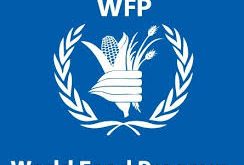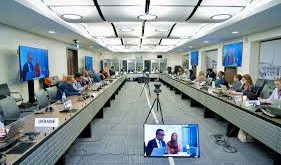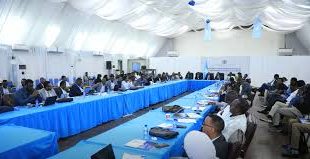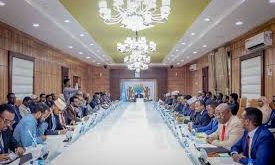GALKAYO (SoOHA) – Nuro Osman Kayman, 56, sold her last healthy goat this month to get cash to try to stave off hunger for her family of nine in Bandardseed village, some 80 kilometers southeast of Galkayo town in Mudug.
Around 1,000 families living in this remote village have been facing acute shortage of water since a trucking service supported by diaspora community funds stopped.
Seven days ago, Nuro sold her goat for $22, which she spent immediately on water and food for her family, and for water and food for her other 20 feeble goats that she is hoping to keep alive.
The village has eight reservoirs but all are privately owned.
“You can take a five or 10-litre jerrycan to fetch water from one of the privately-owned reservoirs, but we cannot get water there regularly,” Nuro told Radio Ergo.
“After a day we have to beg for five liters of water from neighbours. This doesn’t even allow us to cook let have any water for washing.”
The diaspora community stopped water deliveries to the village in May, when most of this area received some rainfall. They had kept up the water deliveries through the previous drought for two years.
The three small open dams in the village filled up briefly after the rain but when by the end of July they were dry again.
Abdisalan Ahmed, another villager, has 10 goats that survived the drought.
He had been buying water on credit from traders selling water but since failing to repay a $29 debt, he is no longer being given credit. He has resorted to a form of begging as he explains.
“I stand on the roadside, wait for vehicles coming to the village, and appeal to drivers to carry some containers and fetch water for me when they get to a nearby village and bring them back to me,” he said.
The villagers are trying to organize themselves collaboratively to buy water from tankers that come weekly from Bitale, 50 km away.
“People contribute some money to buy water from the tankers,” he said. “These are all good people and when they have something to give you they do so. But as you can guess, you cannot survive on 20 liters of water a day, it gets used up in the first half of the day.”
The village chief, Abdullahi Mohamud Isse, said the diaspora community had been paying for the delivery of 300 barrels per week for about two years.
“When most of the livestock died in the drought, the diaspora community from this area decided to gather the pastoralists in this village and deliver water to them,” he said.
“But now for the last four months, there has been no water delivery because they stopped after the rainy season. We have communicated with them and they promised they will resume but it has not started again yet.”
Source: Radio Ergo
 Somali Observatory for Humanitarian Affairs It is a specialized, independent, non-profit media network that observes and follows up the Somali humanitarian scene
Somali Observatory for Humanitarian Affairs It is a specialized, independent, non-profit media network that observes and follows up the Somali humanitarian scene



